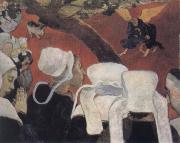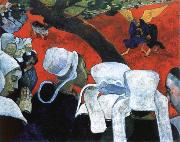
Oil On
Canvas, Real Flavor of Old Masters
|
Paul Gauguin
|
|||
|
|
|||
| French 1848-1903 Paul Gauguin Art Locations (born June 7, 1848, Paris, France ?? died May 8, 1903, Atuona, Hiva Oa, Marquesas Islands, French Polynesia) French painter, sculptor, and printmaker. He spent his childhood in Lima (his mother was a Peruvian Creole). From c. 1872 to 1883 he was a successful stockbroker in Paris. He met Camille Pissarro about 1875, and he exhibited several times with the Impressionists. Disillusioned with bourgeois materialism, in 1886 he moved to Pont-Aven, Brittany, where he became the central figure of a group of artists known as the Pont-Aven school. Gauguin coined the term Synthetism to describe his style during this period, referring to the synthesis of his paintings formal elements with the idea or emotion they conveyed. Late in October 1888 Gauguin traveled to Arles, in the south of France, to stay with Vincent van Gogh. The style of the two men work from this period has been classified as Post-Impressionist because it shows an individual, personal development of Impressionism use of colour, brushstroke, and nontraditional subject matter. Increasingly focused on rejecting the materialism of contemporary culture in favour of a more spiritual, unfettered lifestyle, in 1891 he moved to Tahiti. His works became open protests against materialism. He was an influential innovator; Fauvism owed much to his use of colour, and he inspired Pablo Picasso and the development of Cubism. | |||
|
|
|||
|
|
The Vision after the Sermon new16/Paul Gauguin-567762.jpg Painting ID:: 40797 Visit European Gallery |
mk156 1888 Oil on canvas 73x92cm | |
Height Width |
INS/CM |
||
|
X |
|
||
|
|
|||
|
Paul Gauguin
|
|||
|
|
|||
| French 1848-1903 Paul Gauguin Art Locations (born June 7, 1848, Paris, France ?? died May 8, 1903, Atuona, Hiva Oa, Marquesas Islands, French Polynesia) French painter, sculptor, and printmaker. He spent his childhood in Lima (his mother was a Peruvian Creole). From c. 1872 to 1883 he was a successful stockbroker in Paris. He met Camille Pissarro about 1875, and he exhibited several times with the Impressionists. Disillusioned with bourgeois materialism, in 1886 he moved to Pont-Aven, Brittany, where he became the central figure of a group of artists known as the Pont-Aven school. Gauguin coined the term Synthetism to describe his style during this period, referring to the synthesis of his paintings formal elements with the idea or emotion they conveyed. Late in October 1888 Gauguin traveled to Arles, in the south of France, to stay with Vincent van Gogh. The style of the two men work from this period has been classified as Post-Impressionist because it shows an individual, personal development of Impressionism use of colour, brushstroke, and nontraditional subject matter. Increasingly focused on rejecting the materialism of contemporary culture in favour of a more spiritual, unfettered lifestyle, in 1891 he moved to Tahiti. His works became open protests against materialism. He was an influential innovator; Fauvism owed much to his use of colour, and he inspired Pablo Picasso and the development of Cubism. | |||
|
|
|||
|
|
the vision after the sermon new20/Paul Gauguin-969796.jpg Painting ID:: 56324 Visit European Gallery |
mk247 1888,oil on canvas,28.75x36.25 in,72.2x91 cm,national gallery of scotland,edinburgh,uk | |
Height Width |
INS/CM |
||
|
X |
|
||
|
|
|||








